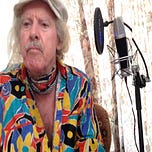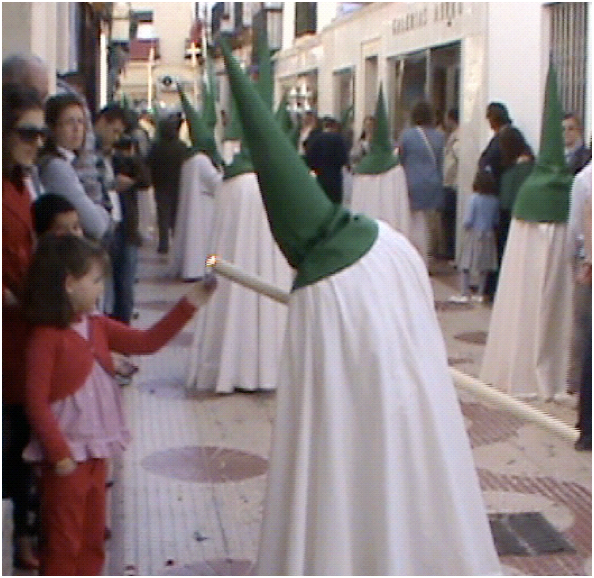Easter time is here again. We cant sit in the square because there is a temporary stage set up, together with sections of raised seating on the opposite side.
We cant sit at a restaurant table because all the outside tables have been cleared away. In fact most of the restaurants are closed. That's because the procession will be coming through this particular street and then along the front, and back round to the church.
I live here, but this year I am not joining the procession. In any case, this is a different sort of procession. This has nothing to do with the stages of the cross. Instead, the main statue of the Virgin is being carried round the town on a portable float. No tractors and carts this time. Underneath the float are human beings shuffling along, carrying the float and statue. Of course, none of them can see where they are going because the float is covered with a massive white cloth which drapes almost to the ground, so by each corner of the float is a guy shouting directions to the shufflers underneath.
They have just reached a particularly narrow corner. The float is jammed against a wall. There is a hiatus. The guides are inspecting the situation and trying to work out how they can guide the shufflers into a better position to get the float round the corner.
There is a lot of backwards shuffling, followed by some sideways shuffling, then a move forward, more sideways shuffling, and eventually the corner is satisfactorily negotiated, and the float and following procession is off again.
The procession halts again at some other difficult corner, and the children go up to the candle bearers and beg for some of the hot wax. Each year they collect some of the wax from these holy candles, and each year their precious bundle of wax grows
It's just another excuse for some fun and games, an ancient ritual, and a kind of celebration, but also for some, especially those shuffling along under the float, it is a time to make some gesture of atonement for past mistakes. I'm tempted to suggest to myself that maybe next year I ought to volunteer.
* * * * *
I'm sitting in a restaurant by the quay at Calpe. The fishing fleet has just come in, and the restaurant staff have been over to buy the fish, and now some of it is on the table before me: a plate of six cigales, or crayfish, and they taste delicious. Next time I think I'll have the red mullet.
Back up in the hills the oranges are still glowing in the trees. Most of the oranges have been harvested, but some groves still have a full complement. And the orange blossom is everywhere. The sweet scent is positively luxurious.
Sometimes by the side of the road is a great yellow bush of mimosa. And when I drive onto the back of a plot of land the herbs are bruised and send up swathes of scent. It seems the whole of Spain smells sweetly of spring-time.
Our apartment looks out over the bay at Altea. I sit on the balcony with a drink before I turn in for the night. The lights of Calpe harbour shine through in the distance, while on each side of me the lights of Albir and Altea Hills rise up in an orange curl. And there is one solitary fishing boat far out in a black sea.
* * * * *
It's market day today! I decide to have an extra snooze, and listen to the waves on the beach, but I'm woken by a racket in the street below. What I don't realize is that part of the racket is some blighter towing my car away! Later I have to hunt for the police station. I can only find the Guardia, not the Policia Local, until some kindly lady points it out to me. It's in a basement!
They send me to the town hall, and there, the smirking so-and-so takes my money before allowing me to retrieve my car. In fact I have to walk half across town and along the river bed to some cruddy fenced-in yard behind the elephant grass and a big pile of earth. There are cars there which must have been waiting for collection for years. They are literally dropping to pieces.
I collect my car, and head back to our local bar.
We have tried several of the local bars, but I rather like one a few miles inland in Benissa. The owners are not Spanish. They come from Colombia. We immediately feel at home. This will, henceforth, be our local, even if we do have to drive down from Altea. It isn't that far.
Julie orders some tapas. I order a glass of wine, and get roped into a card game. Half-way through the first hand my first tapa arrives. It is called a pelota. The word really means a ball. The tapa is, of course, shaped like a large tennis ball, and is a spicy meatball wrapped in a cabbage leaf and doused in lemon juice. It tastes wonderful. I consider ordering another, but I don't get the chance. By the time I have finished the next hand Julie delivers me another tapa. This is a kind of pasty, or empanada, filled with melted cheese.
My wine glass is empty, but not for long. It is accompanied by a tuna and tomato empanada.
The patron comes over, shakes my hand, and mentions my car. I look up. “My car?”
He laughs. Apparently Julie has told the tale of that morning's fiasco.
La Grua was not a term I had learned at school for A-Level Spanish. It was unfortunate that I had to learn it at the local police station. It was even more unfortunate that I had to pay a fine in order to get my own car back. What was even more unfortunate was that the grua was way out in the sticks and I had to walk. But there was worse to come.
I explained to my card playing friends what had happened while one of them shuffled the pack.
I suppose I should not have expected any sympathy. At every complaint of misfortune, they laughed louder, until the story went all round the bar, and someone bought me a glass of rum, presumably just so he could clap me on the back and laugh louder than the rest.
I have often wondered why someone else's misfortune invariably causes mirth. I am told it is a reaction, showing relief that the misfortune has not happened to the others in the room. That is quite clearly bullshit. There's simply something weird about other people.
Of course, I also laugh at other people's misfortune, and on those occasions I am one of those other people as well.
I drink the rum and ask Julie to get me another tapa.”
“What do you want?”
I wave vaguely in the direction of the kitchen. “I don't know. Anything nice.”
I start to play the next round of cards. Lunch comes in fits and starts. My glass keeps getting re-filled. I win a round, lose a round, and the afternoon slides inexorably into evening. Life in Spain has an intriguing way of shunting itself along in bits and pieces, and eventually I am prodded to play one last hand, and then head for home.
I end the day on my balcony, listening to the waves, and eating an orange I'd picked earlier, and sampling a glass of fino together with a selection of sticky almonds. I sit back on my patio and mutter to no-one in particular, “It's a hard life. I don't know how I cope.”
What makes life even harder to bear is the thought that tomorrow could well be the same.
I smile and re-fill the sherry glass.
















Share this post